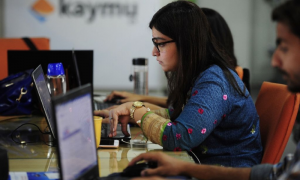
For women in Pakistan, choosing to work in the male-dominated information technology sector often means charting their own path. For those brave enough, there is a double challenge — lack of resources and lack of representation.
Aqsa Kausar, one of the four women who were selected as Google Developer Experts (GDEs) from Pakistan, recalled the difficulty she faced when she started out in the field. “I developed [an] interest in Machine Learning but since there were not a lot of resources available, I had to do a lot of online learning. Learning majorly on my own was, of course, a challenge because there weren’t many people I could go to in case I was stuck on a concept.
“When I applied for the programme, there was no female GDE in Pakistan and there was no GDE in Machine Learning at all.”
Sakina Abbas, whose expertise is Flutter, meanwhile, remained upbeat while talking about her journey, saying “nothing seems like a challenge if you pursue it with passion.”
“It was indeed tiring and difficult to keep up, but at the end of the day, challenges strengthen you and help you become a better version of yourself.”
Sakina stressed the need for the government to encourage more female participation in the IT sector, pointing out that along with training, there was also the need to provide adequate housing for women coming from rural areas.
“They (government) need to create more opportunities for women. They should take measures to create ease for women such as making housing available for single women to come work in hubs such as major cities.“
“The government should also promote STEM entrepreneurship among university students, establish partnerships with private organisations working on STEM entrepreneurship, and improve the capacity of NICs (National Incubation Centres) to incubate IT ventures,” she added.
Mentorship
Speaking about her future goals, Sakina said: “There’s a huge gap between academic life and the tech industry that I want to bridge with the help of my fellow community builders by organising technical workshops and events specifically tailored for university students who have little or no idea which domain to pursue post-graduation.”
According to Sakina, there are very few women in tech in Pakistan despite the potential. “I hope to motivate them to pursue technology without paying much heed to ‘Ye field tou sirf larkon keliye hai, larkiyan nai kar patien’ (this field is only reserved for boys, girls can’t pursue it) by the naysayers. Being GDEs from their own country, from their own gender group, I’m hopeful that women will feel comfortable enough around us to openly share their concerns with us, so that we can guide them and even mentor them,” she concluded.
A Firebase expert, Mariam Aslam shared how she felt when she got shortlisted for the programme. “I was really happy as it was literally a dream come true for me. My hard work of one year had finally paid off. Words couldn’t express my excitement. I was literally jumping in joy on the bed and telling my family that I got selected as GDE,” said Mariam.
Unlike Aqsa, Mariam believes that the government has taken some ‘great’ initiatives for women in tech programmes. She said, however, that the government should also focus on job placement for women working in the IT sector.
Taley’a Mirza had already been working in different communities for developers for the last two to three years when one of her mentors asked her to apply for Google’s GDE programme.
Speaking of the challenges she faced, Taley’a said that it was really important to have sound knowledge of the domain one was applying for in the GDE programme. She believes that if someone had all the required knowledge and the passion to serve the community, he/she must apply for the programme.
Discrimination and lack of awareness
Taley’a attributed the lack of female representation to many families not allowing their daughters to study in co-education institutes and pursue careers. “Unfortunately there are some institutes that do not give admissions to women in tech programmes. This is the level of discrimination that women have to deal with. The government can raise awareness about programmes such as GDE to ensure that the students grow as professionals and learn more skills,” added Taley’a.
Taley’a is not alone in voicing the concerns for lack of female representation in the IT sector. While the country has made some strides regarding female participation, it still has a long way to go.
GDE programme
There are nearly 700 people in Google’s GDE programme — a “global network of highly experienced technology experts, influencers and thought leaders” — of whom 161 are women. Eleven of these GDEs are from Pakistan, including the four women.
Google has said it aims to focus on developing, progressing and retaining these women leaders. More female leaders mean more role models for young women and girls, which is critical if gender parity is to be achieved. The company has built a global employee network for females called ‘Women@Global’, where along with mentoring opportunities, the women are also provided with a chance to grow and connect with women from other parts of the world.
It is not the first time that a tech giant has expanded the scope of women entrepreneurship in Pakistan. Facebook also worked in collaboration with the Women Chamber of Commerce and Industry, Lahore Division, in 2019 with an aim to help women grow their businesses by training them.
 Jago Times "English Edition" Best Online Newspaper
Jago Times "English Edition" Best Online Newspaper